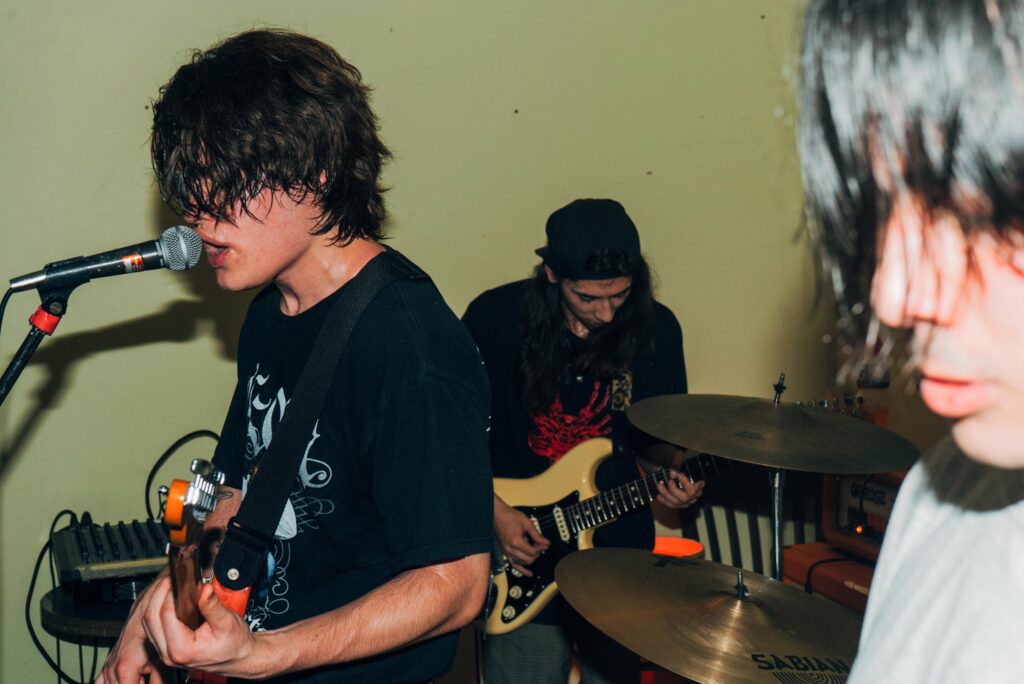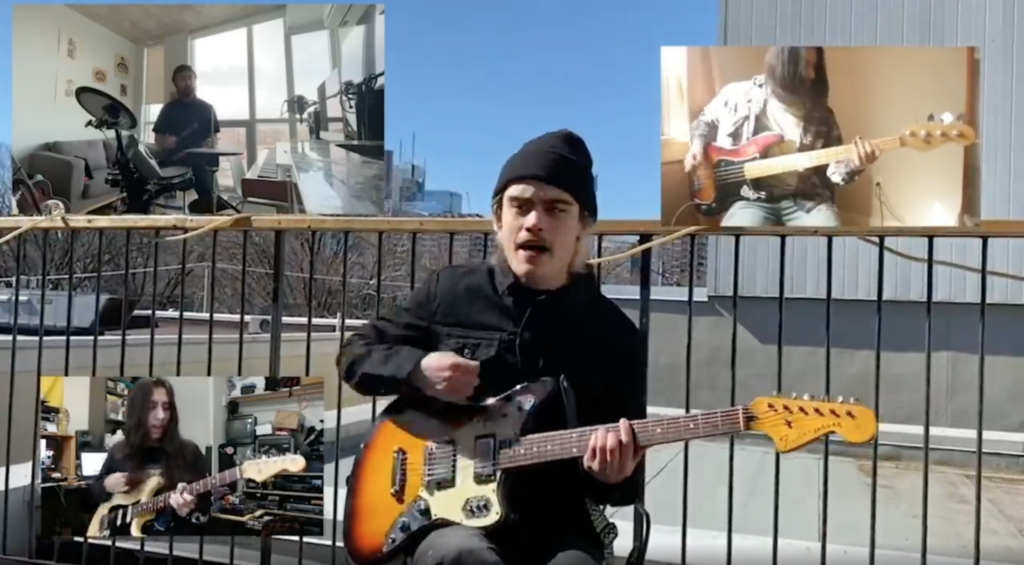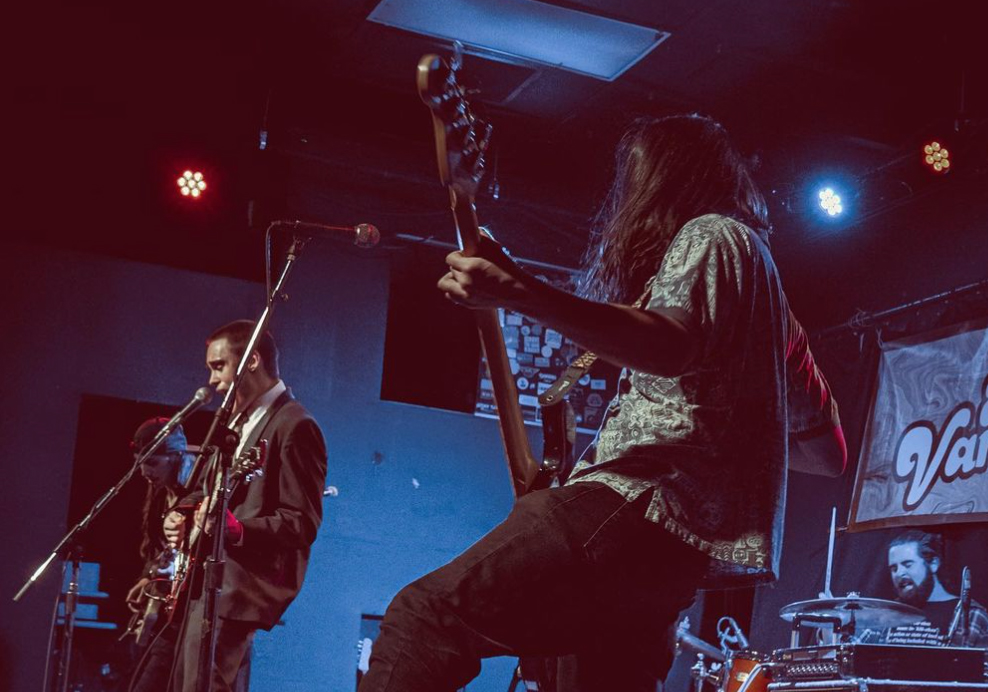By Jackson Duffy
Finn Scott, the awkwardly charming lead singer of local Toronto indie rock band, Frankie the Pig, stood atop the basement stage at the Houndstooth in February 2020, staring out at a crowd of excited fans. From the moment he picked up a guitar at age 10, performing made Scott feel alive. That night was no exception. Amidst the screams from the audience and the colourful lights flashing across his face, he felt like he was on top of the world.

Pandemic-induced lockdowns began less than a month later, shaking the band into a period of hopelessness that would last almost three months. Though the group had been together for nearly eight years at that point, they had just begun to gain real traction. With Scott at the helm, Michael O’Meara on bass, Charlies Sills on guitar, and Jackson Seaward behind the drum kit, the group of friends in their early 20s was known for playing short, energetic sets at local Toronto venues. Prior to the pandemic, they had started to book shows in bigger venues with bands that had larger fan bases, said Scott. Suddenly, “everything was gone in an instant.”
Scott tried to remain hopeful at first. He predicted lockdowns would only last a couple months — at most. Little did he know that the Houndstooth show would be his last time taking the stage for nearly a year and a half.
In April, barely a month into the pandemic, Seaward left the group . It wasn’t a total shock to his bandmates, who came to think of COVID-19 as the tipping point for creative differences. Sills even briefly considered quitting music altogether.
The pandemic devastated the entirety of Canada’s independent music industry. The Canadian Independent Music Association reports that after lockdowns began in March, the industry saw a loss of around $233 million in revenue during the final three quarters of 2020. The Canadian Live Music Association reports that before the pandemic began, venues in Toronto featured live music an average of four times a week — providing an essential career stepping stone for emerging artists. It was a stepping stone Frankie the Pig required desperately, as the band’s progression depended on exposure from live shows.
While solo artists adapted, transitioning into virtual and pre-recorded concerts, “bands didn’t have the same opportunities,” said booking agent Nicole Rochefort, since the severity of restrictions at the time prevented them from being in the same room together.
Frankie the Pig looked for alternate methods of creating music together virtually, though their peers weren’t so fortunate. Of the four other bands present at the Houndstooth show, only one still exists to this day. This reflects a trend in Toronto’s local indie rock scene, as a large number of bands decided to call it quits as a result of restrictions related to the pandemic. Scott personally believes that around half the local scene has disappeared. Frankie the Pig, on the other hand, attempted to persevere. Writing dozens of songs, and improving their overall coherence as a group, the band looked for ways to treat the pandemic as an opportunity instead of an obstacle.
But that decision didn’t happen overnight. In the early months, the band went radio silent, choosing to focus on other aspects of their lives. For Scott, however, music remained at the centre of his life. “Whatever sadness I was feeling at the time, I channelled into writing music,” he said. Soon enough, he had an entire album’s worth of new material. “I started writing a new song each week, which I was nowhere close to before,” he said.

Though Scott had made progress on his own, the band had barely spoken. In June 2020 they met over Zoom to discuss their survival. First on the agenda was finding a new drummer. In July, they settled on Gavin Brown, a former bandmate of Sills.
While the adjustment was difficult for everyone, it was especially tough on Brown, as he had to acclimate with people he couldn’t even see in person He didn’t even get to practice with the group until a few months after joining.
The band met over Zoom on a weekly basis, exchanging voice memos back and forth to piece together separately recorded demos. They also tackled aspects of the band they’d been ignoring before. They improved their social media presence (it was practically non-existent before), found management, and applied for every grant they thought themselves qualified for in an effort to survive. “We actually started to get more done than we did pre-pandemic,” said Scott.


Soon enough, their hard work began to pay off. Throughout the fall, winter, and into the spring of the pandemic’s second year, their grants for recording started to come through, their following on Instagram quadrupled, and they began to formulate a definitive tracklist for their upcoming album, Floor Turned Blue.
As restrictions were lifted, Frankie the Pig finally made its return on Aug. 12, 2021. The band performed at the Supermarket bar in Kensington. While their excitement was at an all time high, so too were their nerves. “We actually started to worry in the weeks leading up to the show that nobody would even show up,” said O’Meara.
There was no reason to worry. The show sold out weeks in advance. Before they even graced the stage, the crowd began to chant their name. None of the other three groups that performed received such a welcome. “It was probably one of the most energetic shows I’d ever been to,” said long-time fan Andrew Daurio.
Scott was struck by the support. “It was really amazing to see that the community hadn’t forgotten about us,” he said. “It motivated me to keep pushing forward.”
The next month, on Sept. 18, Frankie the Pig played Lee’s Palace, one of Toronto’s most historic venues. As Scott walked through the entrance, he noticed a plaque hanging on the wall in the hallway, listing the names of the famous bands that had played before him. Etched into the gold were names such as Nirvana, Pearl Jam, and Radiohead. He froze for a second, the implications of his upcoming performance just starting to set in. This was a stage he’d dreamed of performing on since he was a kid. The band walked onto the stage for sound check, but Scott remained in place for a moment, his emotions beginning to take hold. For the first time in a long time, Scott felt “like I was on the right track.”

Still, the show “didn’t really feel like it was supposed to.” It was, after all, still a pandemic. Government restrictions meant everyone wore masks, the venue was limited to one-quarter of its regular capacity, and everyone was required to remain seated.
Frankie the Pig only played a couple more shows before the Omicron variant sent the province back into lockdown. Where Scott once might have found the lockdown demoralising, now he felt frustrated but less anxious.
“I’m not worried about it in the same way I was with the first,” he said, “but it just sucks because in my eyes we were just getting started.”
Think of the pandemic like a filtration process for bands, says Jonathan Bunce, executive director at Wavelength Music. “Those who managed to stick it out are the ones that are truly dedicated to their craft,” said Bunce. “Music is what they’re meant to be doing.”
That, Scott believes wholeheartedly now. He’s confident Frankie the Pig can endure any challenge at this point. At the beginning of March, prior to the government’s decision to lift most restrictions, Scott smiled when I asked — if given the chance — he’d change anything from the last two years.
He wouldn’t.
“The pandemic gave us the time and perspective we needed to re-evaluate who we are and what our goals are,” he said, “we’ve all become better musicians because of it.”

